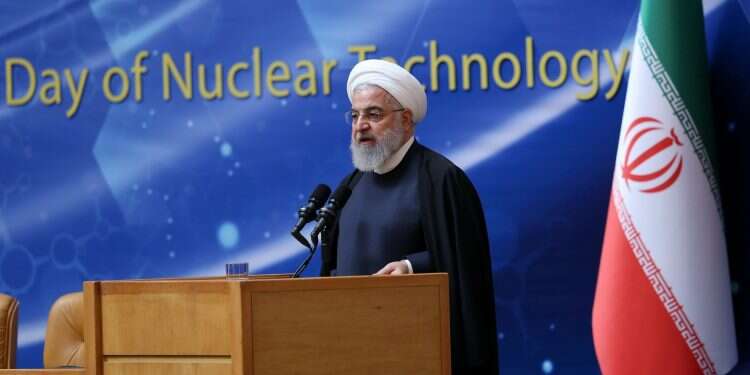Iran quadrupled its uranium-enrichment production capacity amid tensions with the U.S. over Tehran's atomic program, nuclear officials said on Monday, just after President Donald Trump and Iran's foreign minister traded threats and taunts on Twitter.
Iranian officials made a point to stress that the uranium would be enriched only to the 3.67% limit set under the 2015 nuclear deal with world powers, making it usable for a power plant but far below what is needed for an atomic weapon.
But by increasing production, Iran soon will go beyond the stockpile limitations set by the accord. Tehran has set a July 7 deadline for Europe to come up with new terms for the deal, or it will enrich closer to weapons-grade levels in a Middle East already on edge. The Trump administration has deployed bombers and an aircraft carrier to the region over still-unspecified threats from Iran.
Already this month, officials in the United Arab Emirates alleged that four oil tankers were damaged in a sabotage attack; Yemeni rebels allied with Iran launched a drone attack on an oil pipeline in Saudi Arabia; and U.S. diplomats relayed a warning that commercial airlines could be misidentified by Iran and attacked, something dismissed by Tehran.
A rocket landed Sunday near the U.S. Embassy in the Green Zone of Iraq's capital of Baghdad, days after nonessential U.S. staff were ordered to evacuate from diplomatic posts in the country. No one was reported injured. Iraqi military spokesman Brig. Gen. Yahya Rasoul told The Associated Press that the rocket was believed to have been fired from eastern Baghdad, an area home to Iran-backed Shiite militias.
The Iranian enrichment announcement came after local journalists traveled to Natanz in central Iran, the country's underground enrichment facility. There, an unidentified nuclear scientist gave a statement with a surgical cap and a mask covering most of his face. No one explained his choice of outfit.
The state-run Islamic Republic News Agency later quoted Behrouz Kamalvandi, the spokesman of the Atomic Energy Organization of Iran, as acknowledging that capacity had been quadrupled. He said Iran took this step because the U.S. had ended a program allowing it to exchange enriched uranium to Russia for unprocessed yellowcake uranium, as well as ending the sale of heavy water to Oman. Heavy water helps cool reactors producing plutonium that can be used in nuclear weapons.
Kamalvandi said that Iran had informed the International Atomic Energy Agency, the U.N. nuclear watchdog, of the development. The Vienna-based agency did not respond to a request for comment. Tehran has long insisted it does not seek nuclear weapons, though the West fears its program could allow it to build them.
Before Iran's announcement, Trump tweeted: "If Iran wants to fight, that will be the official end of Iran. Never threaten the United States again!"
Trump's remarks reflect what has been a strategy of alternating tough talk with more conciliatory statements he says is aimed at keeping Iran guessing at the administration's intentions. He also said he wanted Iran to call him and engage in negotiations




